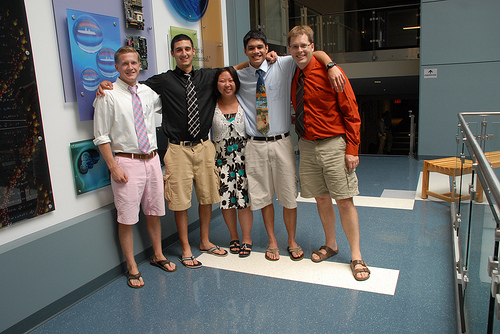Summer research is nothing new to the Elizabethtown College campus, but the Office of Sponsored Research and Programs and the Dean of Faculty are putting a new spin on it. Starting in the summer of 2013, they standardized summer research by kicking off the College’s SCARP Program.
SCARP—Scholarship, Creative Arts and Research Projects—provides students the opportunity to engage in research with a faculty member during a three- to 10-week period over the summer. Additionally, students receive a training stipend and room and board for the duration of the research project. This past summer, 22 students and 14 faculty members from a variety of disciplines participated. According to the Office of Sponsored Research and Program, the program was a commendable success. At the end of the summer, a two-day conference was held which allowed participates to share their work. The conference was well-attended, even with participants from outside of the program. A similar conference is planned for the summer of 2014.
Rick Basom ’81, executive director of sponsored research, remembers his time spent as a summer research assistant with Dr. Don Kraybill and the doors that were opened by the opportunity. By the time Basom graduated, he already had two published articles, which made him stand out in the graduate school application process. He hopes that current students recognize that having research experience on their resume attracts the attention of admittance committees and employers and he encourages all students to participate in the program.
The advantage of SCARP over other summer research programs was that I was able to engage in the same research I had been doing and then continue with it this year.”
One of the advantages of SCARP is the depth of the research in which the students engage. “Because the program is so intensive, I see it as being longer-term,” said Jean Pretz, associate professor of psychology and a SCARP faculty mentor. “It allows students to see the project through the whole way.” For students who conduct research during the semester, SCARP has added bonuses. “The advantage of SCARP over other summer research programs was that I was able to engage in the same research I had been doing and then continue with it this year,” said senior chemistry major Katie Olsen.
For many majors, research is integral to the learning process. “The foundation to learning science is doing science,” said James MacKay, assistant professor of chemistry, and Olsen’s faculty mentor. “When Katie started as a sophomore, much of what she did was basic organic chemistry, now she is doing work similar to what I would have done in graduate school.”
Students are not the only ones who benefit from the program. The research that is conducted is at least tangentially related to faculty research interests. Having student assistants allows faculty members to foster their own research and stay engaged with their students. Additionally, participating faculty members are provided with a stipend for mentoring student researchers.
Students and faculty members from all departments are invited to apply for the program. Students interested in participating in SCARP should talk to their potential faculty mentor as soon as possible. Faculty members can then submit an online application. The application is due by 5 p.m. Friday, Jan. 17, 2014. A review committee will select the faculty/student project for participation in the 2014 Summer SCARP Program and will announce the results by Feb. 7, 2014. Faculty members with externally funded projects also can be included in SCARP and should contact Rick Basom to make arrangements. For more information contact Rick Basom at basomr@etown.edu or Fletcher McClellan, Dean of Faculty at mcclelef@etown.edu.


